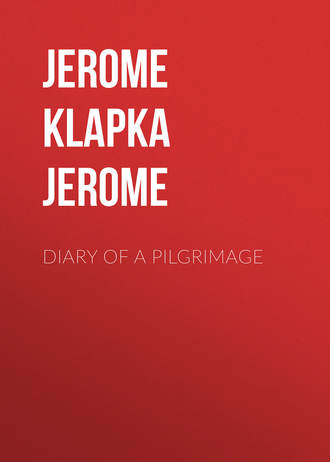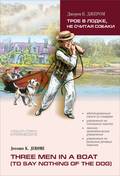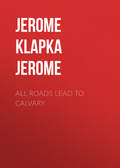
Джером К. Джером
Diary of a Pilgrimage
He becomes quite angry at this, and says he can show me the figures in the guide-book.
“The guide-book!” I reply, scornfully. “You’ll believe a newspaper next!”
B. asks me, indignantly, what height I should say they are, then. I examine them critically for a few minutes, and then give it as my opinion that they do not exceed 510 feet at the very outside. B. seems annoyed with me, and we enter the church in silence.
There is little to be said about a cathedral. Except to the professional sightseer, one is very much like another. Their beauty to me lies, not in the paintings and sculpture they give houseroom to, nor in the bones and bric-à-brac piled up in their cellars, but in themselves – their echoing vastness, their deep silence.
Above the little homes of men, above the noisy teeming streets, they rise like some soft strain of perfect music, cleaving its way amid the jangle of discordant notes. Here, where the voices of the world sound faint; here, where the city’s glamour comes not in, it is good to rest for a while – if only the pestering guides would leave one alone – and think.
There is much help in Silence. From its touch we gain renewed life. Silence is to the Soul what his Mother Earth was to Briareus. From contact with it we rise healed of our hurts and strengthened for the fight.
Amid the babel of the schools we stand bewildered and affrighted. Silence gives us peace and hope. Silence teaches us no creed, only that God’s arms are around the universe.
How small and unimportant seem all our fretful troubles and ambitions when we stand with them in our hand before the great calm face of Silence! We smile at them ourselves, and are ashamed.
Silence teaches us how little we are – how great we are. In the world’s market-places we are tinkers, tailors, apothecaries, thieves – respectable or otherwise, as the case may be – mere atoms of a mighty machine – mere insects in a vast hive.
It is only in Silence that it comes home to us that we are something much greater than this – that we are men, with all the universe and all eternity before us.
It is in Silence we hear the voice of Truth. The temples and the marts of men echo all night and day to the clamour of lies and shams and quackeries. But in Silence falsehood cannot live. You cannot float a lie on Silence. A lie has to be puffed aloft, and kept from falling by men’s breath. Leave a lie on the bosom of Silence, and it sinks. A truth floats there fair and stately, like some stout ship upon a deep ocean. Silence buoys her up lovingly for all men to see. Not until she has grown worn-out and rotten, and is no longer a truth, will the waters of Silence close over her.
Silence is the only real thing we can lay hold of in this world of passing dreams. Time is a shadow that will vanish with the twilight of humanity; but Silence is a part of the eternal. All things that are true and lasting have been taught to men’s hearts by Silence.
Among all nations, there should be vast temples raised where the people might worship Silence and listen to it, for it is the voice of God.
These fair churches and cathedrals that men have reared around them throughout the world, have been built as homes for mere creeds – this one for Protestantism, that one for Romanism, another for Mahomedanism. But God’s Silence dwells in all alike, only driven forth at times by the tinkling of bells and the mumbling of prayers; and, in them, it is good to sit awhile and have communion with her.
We strolled round, before we came out. Just by the entrance to the choir an official stopped me, and asked me if I wanted to go and see a lot of fal-lal things he had got on show – relics and bones, and old masters, and such-like Wardour-street rubbish.
I told him, “No”; and attempted to pass on, but he said:
“No, no! You don’t pay, you don’t go in there,” and shut the gate.
He said this sentence in English; and the precision and fluency with which he delivered it rather suggested the idea that it was a phrase much in request, and one that he had had a good deal of practice in.
It is very prevalent throughout Germany, this custom of not allowing you to go in to see a thing unless you pay.
END OF SATURDAY, 24TH, AND BEGINNING OF SUNDAY, 25TH – CONTINUED
The Rhine! – How History is Written. – Complicated Villages. – How a Peaceful Community Was Very Much Upset. – The German Railway Guard. – His Passion for Tickets. – We Diffuse Comfort and Joy Wherever We Go, Gladdening the Weary, and Bringing Smiles to Them that Weep. – “Tickets, Please.” – Hunting Experiences. – A Natural Mistake. – Free Acrobatic Performance by the Guard. – The Railway Authorities’ Little Joke. – Why We Should Think of the Sorrows of Others.
We returned to the station just in time to secure comfortable seats, and at 5.10 steamed out upon our fifteen hours’ run to Munich. From Bonn to Mayence the line keeps by the side of the Rhine nearly the whole of the way, and we had a splendid view of the river, with the old-world towns and villages that cluster round its bank, the misty mountains that make early twilight upon its swiftly rolling waves, the castled crags and precipices that rise up sheer and majestic from its margin, the wooded rocks that hang with threatening frown above its sombre depths, the ruined towers and turrets that cap each point along its shores, the pleasant isles that stud like gems its broad expanse of waters.
Few things in this world come up to expectation, especially those things of which one has been led to expect much, and about which one has heard a good deal. With this philosophy running in my head, I was prepared to find the Rhine a much over-rated river.
I was pleasantly disappointed. The panorama which unfolded itself before our eyes, as we sped along through the quiet twilight that was deepening into starry night, was wonderfully beautiful, entrancing and expressive.
I do not intend to describe it to you. To do justice to the theme, I should have to be even a more brilliant and powerful writer than I am. To attempt the subject, without doing it justice, would be a waste of your time, sweet reader, and of mine – a still more important matter.
I confess it was not my original intention to let you off so easily. I started with the idea of giving you a rapid but glowing and eloquent word-picture of the valley of the Rhine from Cologne to Mayence. For background, I thought I would sketch in the historical and legendary events connected with the district, and against this, for a foreground, I would draw, in vivid colours, the modern aspect of the scene, with remarks and observations thereon.
Here are my rough notes, made for the purpose: —
Mems. for Chapter on Rhine: “Constantine the Great used to come here – so did Agrippa. (N.B. – Try and find out something about Agrippa.) Cæsar had a good deal to do with the Rhine – also Nero’s mother.”
(To the reader. – The brevity of these memoranda renders their import, at times, confusing. For instance, this means that Cæsar and Nero’s mother both had a good deal to do with the Rhine; not that Cæsar had a good deal to do with Nero’s mother. I explain this because I should be sorry to convey any false impression concerning either the lady or Cæsar. Scandal is a thing abhorrent to my nature.)
Notes continued: “The Ubii did something on the right bank of the Rhine at an early period, and afterwards were found on the other side. (Expect the Ubii were a tribe; but make sure of this, as they might be something in the fossil line.) Cologne was the cradle of German art. Talk about art and the old masters. Treat them in a kindly and gentle spirit. They are dead now. Saint Ursula was murdered at Cologne, with eleven thousand virgin attendants. There must have been quite a party of them. Draw powerful and pathetic imaginary picture of the slaughter. (N.B. – Find out who murdered them all.) Say something about the Emperor Maximilian. Call him ‘the mighty Maximilian.’ Mention Charlemagne (a good deal should be made out of Charlemagne) and the Franks. (Find out all about the Franks, and where they lived, and what has become of them.) Sketch the various contests between the Romans and the Goths. (Read up ‘Gibbon’ for this, unless you can get enough out of Mangnall’s Questions.) Give picturesque account – with comments – of the battles between the citizens of Cologne and their haughty archbishops. (N.B. – Let them fight on a bridge over the Rhine, unless it is distinctly stated somewhere that they didn’t.) Bring in the Minne-singers, especially Walter von Vogelweid; make him sing under a castle-wall somewhere, and let the girl die. Talk about Albert Dürer. Criticise his style. Say it’s flat. (If possible, find out if it is flat.) “The rat tower on the Rhine,” near Bingen. Describe the place and tell the whole story. Don’t spin it out too long, because everybody knows it. “The Brothers of Bornhofen,” story connected with the twin castles of Sterrenberg and Liebenstein, Conrad and Heinrich – brothers – both love Hildegarde. She was very beautiful. Heinrich generously refuses to marry the beautiful Hildegarde, and goes away to the Crusades, leaving her to his brother Conrad. Conrad considers over the matter for a year or two, and then he decides that he won’t marry her either, but will leave her for his brother Heinrich, and he goes off to the Crusades, from whence he returns, a few years later on, with a Grecian bride. The beautiful H., muddled up between the pair of them, and the victim of too much generosity, gets sulky (don’t blame her), and shuts herself up in a lonely part of the castle, and won’t see anybody for years. Chivalrous Heinrich returns, and is wild that his brother C. has not married the beautiful H. It does not occur to him to marry the girl even then. The feverish yearning displayed by each of these two brothers, that the other one should marry the beloved Hildegarde, is very touching. Heinrich draws his sword, and throws himself upon his brother C. to kill him. The beautiful Hildegarde, however, throws herself between them and reconciliates them, and then, convinced that neither of them means business, and naturally disgusted with the whole affair, retires into a nunnery. Conrad’s Grecian bride subsequently throws herself away on another man, upon which Conrad throws himself on his brother H.’s breast, and they swear eternal friendship. (Make it pathetic. Pretend you have sat amid the ruins in the moonlight, and give the scene – with ghosts.) “Rolandseck,” near Bonn. Tell the story of Roland and Hildegunde (see Baedeker, p. 66). Don’t make it too long, because it is so much like the other. Describe the funeral? The “Watch Tower on the Rhine” below Audernach. Query, isn’t there a song about this? If so, put it in. Coblentz and Ehrenbreitstein. Great fortresses. Call them “the Frowning Sentinels of the State.” Make reflections on the German army, also on war generally. Chat about Frederick the Great. (Read Carlyle’s history of him, and pick out the interesting bits.) The Drachenfels. Quote Byron. Moralise about ruined castles generally, and describe the middle ages, with your views and opinions on same.”
There is much more of it, but that is sufficient to let you see the scheme I had in my head. I have not carried out my scheme, because, when I came to reflect upon the matter, it seemed to me that the idea would develop into something that would be more in the nature of a history of Europe than a chapter in a tourist’s diary, and I determined not to waste my time upon it, until there arose a greater public demand for a new History of Europe than there appears to exist at present.
“Besides,” I argued to myself, “such a work would be just the very thing with which to beguile the tedium of a long imprisonment. At some future time I may be glad of a labour of this magnitude to occupy a period of involuntary inaction.”
“This is the sort of thing,” I said to myself, “to save up for Holloway or Pentonville.”
It would have been a very enjoyable ride altogether, that evening’s spin along the banks of the Rhine, if I had not been haunted at the time by the idea that I should have to write an account of it next day in my diary. As it was, I enjoyed it as a man enjoys a dinner when he has got to make a speech after it, or as a critic enjoys a play.
We passed such odd little villages every here and there. Little places so crowded up between the railway and the river that there was no room in them for any streets. All the houses were jumbled up together just anyhow, and how any man who lived in the middle could get home without climbing over half the other houses in the place I could not make out. They were the sort of villages where a man’s mother-in-law, coming to pay him a visit, might wander around all day, hearing him, and even now and then seeing him, yet never being able to get at him in consequence of not knowing the way in.
A drunken man, living in one of these villages, could never hope to get home. He would have to sit down outside, and wait till his head was clear.
We witnessed the opening scenes of a very amusing little comedy at one of the towns where the train drew up. The chief characters were played by an active young goat, a small boy, an elderly man and a woman, parents of the small boy and owners of the goat, and a dog.
First we heard a yell, and then, from out a cottage opposite the station, bounded an innocent and happy goat, and gambolled around. A long rope, one end of which was fastened to his neck, trailed behind him. After the goat (in the double sense of the phrase) came a child. The child tried to catch the goat by means of the rope, caught itself in the rope instead, and went down with a bump and a screech. Whereupon a stout woman, the boy’s mother apparently, ran out from the cottage, and also made for the goat. The goat flew down the road, and the woman flew after it. At the first corner, the woman trod on the rope, and then she went down with a bump and a screech. Then the goat turned and ran up the street, and, as it passed the cottage, the father ran out and tried to stop it. He was an old man, but still seemed to have plenty of vigour in him. He evidently guessed how his wife and child had gone down, and he endeavoured to avoid the rope and to skip over it when it came near him. But the goat’s movements were too erratic for him. His turn came, and he trod on the rope, and went down in the middle of the road, opposite his own door, with a thud that shook us all up against each other as we stood looking out of the carriage-window, and sat there and cursed the goat. Then out ran a dog, barking furiously, and he went for the goat, and got the end of the rope in his teeth and held on to it like grim death. Away went the goat, at his end of the rope, and, with him, the dog at the other end. Between them, they kept the rope about six inches above the ground, and with it they remorselessly mowed down every living thing they came across in that once peaceful village. In the course of less than half a minute we counted fourteen persons sitting down in the middle of the road. Eight of them were cursing the goat, four were cursing the dog, and two of them were cursing the old man for keeping the goat, one of these two, and the more violent one, being the man’s own wife.
The train left at this juncture. We entreated the railway officials to let us stop and see the show out. The play was becoming quite interesting. It was so full of movement. But they said that we were half-an-hour late as it was, and that they dared not.
We leaned out of the window, and watched for as long as we could; and after the village was lost to view in the distance, we could still, by listening carefully, hear the thuds, as one after another of the inhabitants sat down and began to swear.
At about eleven o’clock we had some beer – you can generally obtain such light refreshment as bottled beer and coffee and rolls from the guard on a through long-distance train in Germany – took off our boots, and saying “Good-night” to each other, made a great show of going to sleep. But we never succeeded in getting there. They wanted to see one’s ticket too often for one to get fairly off.
Every few minutes, so it seemed to me, though in reality the intervals may perhaps have been longer, a ghostly face would appear at the carriage-window, and ask to see our tickets.
Whenever a German railway-guard feels lonesome, and does not know what else to do with himself, he takes a walk round the train, and gets the passengers to show him their tickets, after which he returns to his box cheered and refreshed. Some people rave about sunsets and mountains and old masters; but to the German railway-guard the world can show nothing more satisfying, more inspiring, than the sight of a railway-ticket.
Nearly all the German railway officials have this same craving for tickets. If only they get somebody to show them a railway-ticket, they are happy. It seemed a harmless weakness of theirs, and B. and I decided that it would be only kind to humour them in it during our stay.
Accordingly, whenever we saw a German railway official standing about, looking sad and weary, we went up to him and showed him our tickets. The sight was like a ray of sunshine to him; and all his care was immediately forgotten. If we had not a ticket with us at the time, we went and bought one. A mere single third to the next station would gladden him sufficiently in most cases; but if the poor fellow appeared very woe-begone, and as if he wanted more than ordinary cheering up, we got him a second-class return.
For the purpose of our journey to Ober-Ammergau and back, we each carried with us a folio containing some ten or twelve first-class tickets between different towns, covering in all a distance of some thousand miles; and one afternoon, at Munich, seeing a railway official, a cloak-room keeper, who they told us had lately lost his aunt, and who looked exceptionally dejected, I proposed to B. that we should take this man into a quiet corner, and both of us show him all our tickets at once – the whole twenty or twenty-four of them – and let him take them in his hand and look at them for as long as he liked. I wanted to comfort him.
B., however, advised against the suggestion. He said that even if it did not turn the man’s head (and it was more than probable that it would), so much jealousy would be created against him among the other railway people throughout Germany, that his life would be made a misery to him.
So we bought and showed him a first-class return to the next station but one; and it was quite pathetic to watch the poor fellow’s face brighten up at the sight, and to see the faint smile creep back to the lips from which it had so long been absent.
But at times, one wishes that the German railway official would control his passion for tickets – or, at least, keep it within due bounds.
Even the most kindly-hearted man grows tired of showing his ticket all day and night long, and the middle of a wearisome journey is not the proper time for a man to come to the carriage-window and clamour to see your “billet.”
You are weary and sleepy. You do not know where your ticket is. You are not quite sure that you have got a ticket; or if you ever had one, somebody has taken it away from you. You have put it by very carefully, thinking that it would not be wanted for hours, and have forgotten where.
There are eleven pockets in the suit you have on, and five more in the overcoat on the rack. Maybe, it is in one of those pockets. If not, it is possibly in one of the bags – somewhere, or in your pocket-book, if you only knew where that was, or your purse.
You begin a search. You stand up and shake yourself. Then you have another feel all over. You look round in the course of the proceedings; and the sight of the crowd of curious faces watching you, and of the man in uniform waiting with his eye fixed severely upon you, convey to you, in your then state of confusion, the momentary idea that this is a police-court scene, and that if the ticket is found upon you, you will probably get five years.
Upon this you vehemently protest your innocence.
“I tell you I haven’t got it!” you exclaim; – “never seen the gentleman’s ticket. You let me go! I – ”
Here the surprise of your fellow-passengers recalls you to yourself, and you proceed on your exploration. You overhaul the bags, turning everything out on to the floor, muttering curses on the whole railway system of Germany as you do so. Then you feel in your boots. You make everybody near you stand up to see if they are sitting upon it, and you go down on your knees and grovel for it under the seat.
“You didn’t throw it out of the window with your sandwiches, did you?” asks your friend.
“No! Do you think I’m a fool?” you answer, irritably. “What should I want to do that for?”
On going systematically over yourself for about the twentieth time, you discover it in your waistcoat pocket, and for the next half-hour you sit and wonder how you came to miss it on the previous nineteen occasions.
Meanwhile, during this trying scene, the conduct of the guard has certainly not tended to allay your anxiety and nervousness. All the time that you have been looking for your ticket, he has been doing silly tricks on the step outside, imperilling his life by every means that experience and ingenuity can suggest.
The train is going at the rate of thirty miles an hour, the express speed in Germany, and a bridge comes in sight crossing over the line. On seeing this bridge, the guard, holding on by the window, leans his body as far back as ever it will go. You look at him, and then at the rapidly-nearing bridge, and calculate that the arch will just take his head off without injuring any other part of him whatever, and you wonder whether the head will be jerked into the carriage or will fall outside.
When he is three inches off the bridge, he pulls himself up straight, and the brickwork, as the train dashes through, kills a fly that was trespassing on the upper part of his right ear.
Then, when the bridge is passed, and the train is skirting the very edge of a precipice, so that a stone dropped just outside the window would tumble straight down 300 feet, he suddenly lets go, and, balancing himself on the foot-board without holding on to anything, commences to dance a sort of Teutonic cellar-flap, and to warm his body by flinging his arms about in the manner of cabmen on a cold day.
The first essential to comfortable railway travelling in Germany is to make up your mind not to care a rap whether the guard gets killed in the course of the journey or not. Any tender feeling towards the guard makes railway travelling in the Fatherland a simple torture.
At five a.m. (how fair and sweet and fresh the earth looks in the early morning! Those lazy people who lie in bed till eight or nine miss half the beauty of the day, if they but knew it. It is only we who rise early that really enjoy Nature properly) I gave up trying to get to sleep, and made my way to the dressing-room at the end of the car, and had a wash.
It is difficult to wash in these little places, because the cars shake so; and when you have got both your hands and half your head in the basin, and are unable to protect yourself, the sides of the room, and the water-tap and the soap-dish, and other cowardly things, take a mean advantage of your helplessness to punch you as hard as ever they can; and when you back away from these, the door swings open and slaps you from behind.
I succeeded, however, in getting myself fairly wet all over, even if I did nothing else, and then I looked about for a towel. Of course, there was no towel. That is the trick. The idea of the railway authorities is to lure the passenger, by providing him with soap and water and a basin, into getting himself thoroughly soaked, and then to let it dawn upon him that there is no towel. That is their notion of fun!
I thought of the handkerchiefs in my bag, but to get to them I should have to pass compartments containing ladies, and I was only in early morning dress.
So I had to wipe myself with a newspaper which I happened to have in my pocket, and a more unsatisfactory thing to dry oneself upon I cannot conceive.
I woke up B. when I got back to the carriage, and persuaded him to go and have a wash; and in listening to the distant sound of his remarks when he likewise discovered that there was no towel, the recollection of my own discomfiture passed gently away.
Ah! how true it is, as good people tell us, that in thinking of the sorrows of others, we learn to forget our own!
For fifty miles before one reaches Munich, the land is flat, stale, and apparently very unprofitable, and there is little to interest the looker-out. He sits straining his eyes towards the horizon, eagerly longing for some sign of the city to come in sight.
It lies very low, however, and does all it can to escape observation; and it is not until he is almost within its streets that he discovers it.







